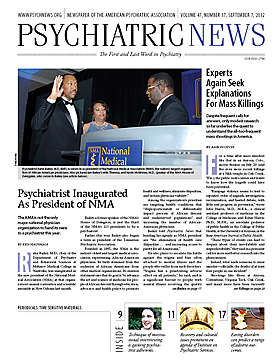Many years ago, autism spectrum disorders were sometimes regarded as childhood schizophrenia. Then, in 1980, with the publication of an updated edition of APA’s Diagnostic and Statistical Manual of Mental Disorders (DSM-III), autism spectrum disorders and schizophrenia came to be defined as separate disorders. That continues to be the case today.
In 2005, however, Danish researchers reported that having a parent with schizophrenia was linked with having an autism spectrum disorder, suggesting that schizophrenia and autism spectrum disorders might have some genetic overlap. And now an international team has produced similar findings.
The lead researcher was Patrick Sullivan, M.D., a professor of psychiatry and genetics at the University of North Carolina. The results were published online July 2 in the Archives of General Psychiatry.
Sullivan and his team looked to see whether they could find a link between having a parent or sibling with schizophrenia and having autism spectrum disorders in three large population samples. One came from Stockholm, Sweden; one from Sweden overall; and one from Israel. The samples included national personal identification numbers, multi-generation registry data, a national pre-conscription mental health assessment, or other attributes that made them ideal for testing such a hypothesis.
“The findings were clear,” Sullivan and his group reported. “The presence of schizophrenia…in first-degree relatives was a consistent and significant risk factor for autism spectrum disorders in all three samples.”
They found in the Stockholm and Swedenwide cohorts that if an individual had a parent or a sibling with schizophrenia, the chances of having an autism spectrum disorder were three times greater than for individuals without a parent or a sibling with schizophrenia.
And they found in the Israeli cohort that if a person had a sibling with schizophrenia, then his or her chances of having an autism spectrum disorder were 12 times greater than those of individuals without a sibling with schizophrenia.
Thus this study, as well as the Danish one, suggest that schizophrenia and autism spectrum disorders appear to share certain genes. Other scientists have reported that some rare variations in gene copy number—notably in genes on chromosomes 15, 16, and 22—are strong risk factors for developing schizophrenia and autism spectrum disorders.
And given the increasing evidence for a genetic overlap between schizophrenia and bipolar disorder, Sullivan and his colleagues also looked to see in their study populations whether having a parent with bipolar disorder was linked with a child’s heightened risk of having an autism spectrum disorder.
And they did find such a link. But the link was weaker than that for schizophrenia and autism. That is, an individual having a parent with bipolar disorder was twice as likely to have an autism spectrum disorder as was an individual having a parent without bipolar disorder, in contrast to findings for schizophrenia, where the odds ratio was 3 to 1.
A possible implication of these findings, the researchers indicated, is that schizophrenia and autism spectrum disorders—and perhaps bipolar disorder and autism spectrum disorders—may share certain clinical characteristics that have previously eluded scientists. For instance, some individuals with an autism spectrum disorder might experience psychotic symptoms.
The challenge now, the researchers said, is to identify genetic variants common to schizophrenia, bipolar disorder, and autism spectrum disorders. Scientists participating in the Psychiatric Genomics Consortium (PGC) will be attempting to do so, they said.
The PGC is an international project to identify genetic variants that underlie schizophrenia, bipolar disorder, autism spectrum disorders, major depressive disorder, and attention-deficit/hyperactivity disorder. It was founded in 2007 and is headed by Sullivan. PGC scientists are from more than 60 institutions in 19 countries.

